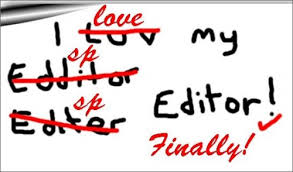 Writing “The End” at the end of a manuscript is a luxurious feeling. Tons of anxiety and pressure fall from my shoulders, and I know I have finished another novel. It’s a bit sad, too, to have lived with these characters I love and admire and then end our relationship for a period of time. (Actually, I guess I ended the relationship of some of the characters I killed instead of loved and admired.) But I also know that it’s time to make lots of changes in the manuscript I’ve spent months writing. “The End” is not really the end. I have many post-writing chores to do, some of them fun, some of them drudgery.
Writing “The End” at the end of a manuscript is a luxurious feeling. Tons of anxiety and pressure fall from my shoulders, and I know I have finished another novel. It’s a bit sad, too, to have lived with these characters I love and admire and then end our relationship for a period of time. (Actually, I guess I ended the relationship of some of the characters I killed instead of loved and admired.) But I also know that it’s time to make lots of changes in the manuscript I’ve spent months writing. “The End” is not really the end. I have many post-writing chores to do, some of them fun, some of them drudgery.
First, I send my manuscript off (it isn’t really a “book” yet, is it?) to four Beta readers. These are people I trust to read my manuscript and give me feedback about what readers might say. For example, they tell me when they are “taken out” of the reading moment by something jarring. My four beta readers on book two are all senior citizens, two of them in their seventies and two in their eighties. They are life-long readers and learners. I give them a set of questions to think about as they are reading and ask for feedback.
Then, I send my manuscript to my freelance editor, Lourdes Venard. I know she will tear it apart, tell me to change entire chapters or move entire incidents, and fix errors and transitions so it will work much better. But she does this all lovingly. Yes, I am smiling as I type that last sentence. In my first novel she had me rewrite two chapters from a different point of view. The second novel had fewer of those frightening incidents. But I know I can trust her judgment, and this makes all the difference. She has never led me astray, and she really knows about editing and writing.
incidents, and fix errors and transitions so it will work much better. But she does this all lovingly. Yes, I am smiling as I type that last sentence. In my first novel she had me rewrite two chapters from a different point of view. The second novel had fewer of those frightening incidents. But I know I can trust her judgment, and this makes all the difference. She has never led me astray, and she really knows about editing and writing.
The third post writing step is to decide on the “Acknowledgements.” This is always difficult. I keep a list as I’m writing the manuscript, but I am always afraid I will forget someone.
 Next, I have to write a one-page, single-spaced, synopsis of the entire plot. Now here is where people will say, “But you wrote Cliffs Notes where you had to shrink everything. Why can’t you do this easily?” I can’t. This is the hardest part of the after events. Shrinking my own writing is so difficult. It is the opposite of everything I taught to reluctant high school students who thought one paragraph was an essay. It goes against my usual mode of operation where I expand instead of contract. But, somehow I have to do it and I do. It’s choppy and lacks transitions, but every word counts.
Next, I have to write a one-page, single-spaced, synopsis of the entire plot. Now here is where people will say, “But you wrote Cliffs Notes where you had to shrink everything. Why can’t you do this easily?” I can’t. This is the hardest part of the after events. Shrinking my own writing is so difficult. It is the opposite of everything I taught to reluctant high school students who thought one paragraph was an essay. It goes against my usual mode of operation where I expand instead of contract. But, somehow I have to do it and I do. It’s choppy and lacks transitions, but every word counts.
Next, is another piece of drudgery. Every publisher has a formatting style they prefer. So now I must go through my entire manuscript and format it so that it follows the publisher’s guidelines. This includes things like changing the beginning of paragraphs away from the tab bar function and replacing them by a 1.5” indent. It involves rules for double quote marks and rules for how I should end chapters. It is very intense, eye-straining work.
Now I’m done with the after events except to double check for typos and errors and then send it off to the publisher.
Next step is to WAIT.
While I am waiting, I look around my house and realize that someone has created chaos and piles of things that need to be organized and put away. Could all of this mess have happened over the last few weeks while I have been doing the after events? Of course. This, too, is part of the work that has to be addressed after the last manuscript page says, “The End.”
